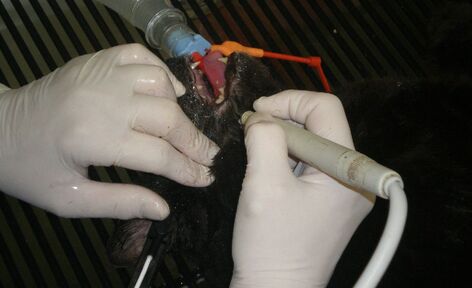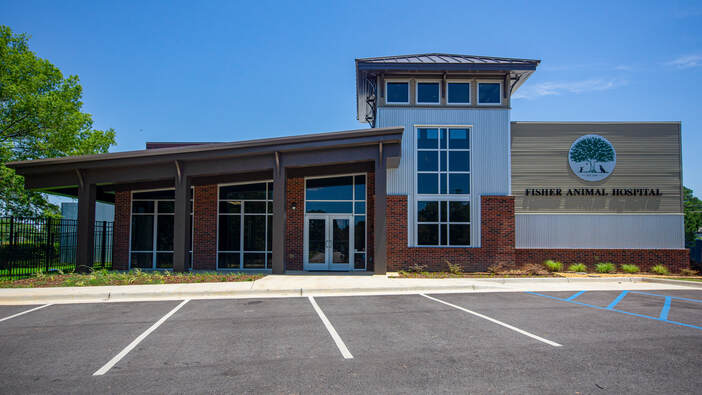Dental Care
Did you know that clean teeth and Routine Dental Care are just as important to your pet's health as they are to yours?

Check your cat or dog for the following symptoms:
- Unnaturally stinky breath
- Excessive drooling, especially with visible blood
- Avoidance of food, treats or toys
- Swelling of the face
- Loose teeth
- Visibly dirty teeth
- Food, hair, tartar build up on or between teeth
- Scratching, rubbing or pawing at the mouth and face
If you notice any of the above symptoms, if you are not currently brushing your pet's teeth at least every two to three days and if you are not having your pet receive routine dental care and exams by a veterinarian we can help! Your pet may be building up plaque and tartar. Plaque and tartar will lead to gingivitis and in more severe cases, even periodontal disease which can have a unhealthy affect on vital organs elsewhere in the body including the heart, kidneys and liver. Any dog or cat who is three years old has likely begun this process and many toy breed dogs, such as chihuahuas, miniature poodles, yorkshire terriers and dachshunds often need dental care at an even younger age. Some puppies even keep their puppy teeth too long causing build-up of plaque within their first year! Often, we extract these retained teeth during a pet's spay or neuter if they are still present to prevent early onset of dental disease.
The first step to adequate dental care in dogs and cats is a professional oral examination every 6 to 12 months depending on your pet's age, breed and medical history. In patients that allow an oral exam without anesthesia this is performed at their annual wellness visits. When only a mild amount of plaque is present, brushing teeth with a pet-safe toothpaste, as often as once daily to every two to three days is a great way to keep your pet's mouth healthy. Prescription dental treats, chews or diets will perform a similar action to brushing as well. At Fisher Animal Hospital, our well trained staff will be glad to show you how to brush your pet's teeth and offer guidance on at home oral care.
When plaque has hardened into tartar, no amount of brushing will remove it. Tartar build up requires a professional cleaning under general anesthesia. Many pet owners worry about frequent anesthesia. Any pet that undergoes anesthesia at Fisher Animal Hospital will undergo a physical exam and recommended blood screening tests and IV catheterization to minimize any risks. All anesthetic procedures are attended by a trained and dedicated veterinary assistant who monitors the patient's heart rate, blood pressure and blood oxygenation during the procedure. During your pet's dental cleaning we begin with an in-depth oral exam using a dental probe to check for signs of dental disease beneath the gumline. Tartar is removed using a handheld ultrasonic dental scaling tool. After removal of tartar and plaque, the teeth are polished to a pearly shine and rinsed using a pet safe oral antiseptic solution.
Often we see pets for tooth root abscesses, fractured teeth or severe halitosis, or stinky breath. In the event that a diseased tooth is beyond repair, our veterinarians are trained in tooth extraction and even minor oral surgeries.
Most dogs and cats should receive an oral exam at least every 6-12 months especially if they are over 3 years old. Most pets require a professional dental cleaning yearly although some, especially toy breeds, may need dental cleanings more frequently. Schedule an appointment today to have your Fisher Animal Hospital veterinarian examine your pet's teeth and to discuss your pet's dental health at 256-766-0343!
What to Expect with Dental Care
It is important to prepare for your pet's dental procedure. At Fisher Animal Hospital, dental's are performed on weekday mornings. Be sure to call ahead at 256-766-0343 to schedule a dental appointment. Your pet may not receive food of any sort after 10:00 pm of the day before anesthesia including the morning of the dental also. However, water is allowed during this time of fasting. Dental patients will need to be checked in between 7:30 am to 8:00 am on the day of the procedure. If this does not work with your schedule we will be happy to board your pet overnight and handle all preparations prior to your pet's procedure. Once you check your pet in, you will speak with a knowledgeable staff member about any details concerning the dental such as recommended blood tests, IV catheters or other services to be completed during your pets visit. Our dental cleanings are considered outpatient procedures and pets will be allowed to return home that same afternoon after 3:00 pm. Your Fisher Animal Hospital staff member will inform you of your pet's expected pick up time.
After check in, your pet will undergo a thorough physical exam and then receive a pre-op pain medication injection if tooth extractions are expected. This injection helps prepare your pet for anesthesia and keeps patients comfortable throughout the procedure and afterward. Once the pain medication has taken effect, you pet will begin anesthesia and a soft endotracheal tube will be placed in your pet's airway to allow safe administration of inhaled anesthetic gases and to prevent aspiration of fluid.
Throughout the procedure one of our dedicated veterinary assistants will monitor the patient's heart rate, respiratory rate, blood pressure and blood oxygenation while the teeth are being examined and cleaned. After the procedure is complete, the patient is slowly taken off of anesthesia and allowed to recover under the dutiful watch of our caring technicians.
The first step to adequate dental care in dogs and cats is a professional oral examination every 6 to 12 months depending on your pet's age, breed and medical history. In patients that allow an oral exam without anesthesia this is performed at their annual wellness visits. When only a mild amount of plaque is present, brushing teeth with a pet-safe toothpaste, as often as once daily to every two to three days is a great way to keep your pet's mouth healthy. Prescription dental treats, chews or diets will perform a similar action to brushing as well. At Fisher Animal Hospital, our well trained staff will be glad to show you how to brush your pet's teeth and offer guidance on at home oral care.
When plaque has hardened into tartar, no amount of brushing will remove it. Tartar build up requires a professional cleaning under general anesthesia. Many pet owners worry about frequent anesthesia. Any pet that undergoes anesthesia at Fisher Animal Hospital will undergo a physical exam and recommended blood screening tests and IV catheterization to minimize any risks. All anesthetic procedures are attended by a trained and dedicated veterinary assistant who monitors the patient's heart rate, blood pressure and blood oxygenation during the procedure. During your pet's dental cleaning we begin with an in-depth oral exam using a dental probe to check for signs of dental disease beneath the gumline. Tartar is removed using a handheld ultrasonic dental scaling tool. After removal of tartar and plaque, the teeth are polished to a pearly shine and rinsed using a pet safe oral antiseptic solution.
Often we see pets for tooth root abscesses, fractured teeth or severe halitosis, or stinky breath. In the event that a diseased tooth is beyond repair, our veterinarians are trained in tooth extraction and even minor oral surgeries.
Most dogs and cats should receive an oral exam at least every 6-12 months especially if they are over 3 years old. Most pets require a professional dental cleaning yearly although some, especially toy breeds, may need dental cleanings more frequently. Schedule an appointment today to have your Fisher Animal Hospital veterinarian examine your pet's teeth and to discuss your pet's dental health at 256-766-0343!
What to Expect with Dental Care
It is important to prepare for your pet's dental procedure. At Fisher Animal Hospital, dental's are performed on weekday mornings. Be sure to call ahead at 256-766-0343 to schedule a dental appointment. Your pet may not receive food of any sort after 10:00 pm of the day before anesthesia including the morning of the dental also. However, water is allowed during this time of fasting. Dental patients will need to be checked in between 7:30 am to 8:00 am on the day of the procedure. If this does not work with your schedule we will be happy to board your pet overnight and handle all preparations prior to your pet's procedure. Once you check your pet in, you will speak with a knowledgeable staff member about any details concerning the dental such as recommended blood tests, IV catheters or other services to be completed during your pets visit. Our dental cleanings are considered outpatient procedures and pets will be allowed to return home that same afternoon after 3:00 pm. Your Fisher Animal Hospital staff member will inform you of your pet's expected pick up time.
After check in, your pet will undergo a thorough physical exam and then receive a pre-op pain medication injection if tooth extractions are expected. This injection helps prepare your pet for anesthesia and keeps patients comfortable throughout the procedure and afterward. Once the pain medication has taken effect, you pet will begin anesthesia and a soft endotracheal tube will be placed in your pet's airway to allow safe administration of inhaled anesthetic gases and to prevent aspiration of fluid.
Throughout the procedure one of our dedicated veterinary assistants will monitor the patient's heart rate, respiratory rate, blood pressure and blood oxygenation while the teeth are being examined and cleaned. After the procedure is complete, the patient is slowly taken off of anesthesia and allowed to recover under the dutiful watch of our caring technicians.

